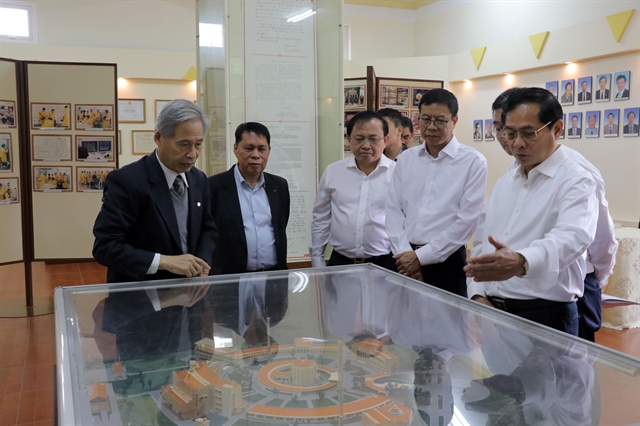 Politics & Law
Politics & Law


|
| Deputy Prime Minister Bùi Thanh Sơn (far right) visits the traditional exhibition room of the Nuclear Research Institute in Lâm Viên - Đà Lạt Ward, Lâm Đồng Province. — VNA/VNS Photo Chu Quốc Hùng |
LÂM ĐỒNG — Deputy Prime Minister Bùi Thanh Sơn on Friday visited the Nuclear Research Institute in Lâm Viên - Đà Lạt Ward, Lâm Đồng Province, to inspect operations at the Đà Lạt Nuclear Reactor and discuss plans to enhance its capacity and long-term sustainability.
Speaking at the working session, Institute Director Cao Đông Vũ said the facility’s core mandate is to operate the Đà Lạt Nuclear Reactor safely and efficiently while promoting scientific research, technological application, training, and human resource development in the field of atomic energy.
The institute also supplies radiopharmaceuticals to twenty-three hospitals nationwide on a weekly basis, providing timely support for the diagnosis and treatment of around 500,000 patients each year. Since its establishment, the facility has produced over 15,000 curies of radioactive products.
In addition to medical applications, the reactor supports a wide range of fields including agriculture, geology, oil and gas, archaeology, transportation, irrigation, and environmental protection through the application of nuclear and isotopic techniques.
The institute proposed studying the use of new nuclear fuel to increase the reactor’s capacity by two to three times its current level, upgrading its technology systems, and ensuring sufficient fuel supplies to maintain operations beyond 2030.
Representatives from the Ministries of Science and Technology, Finance, and Education and Training, along with Lâm Đồng authorities, expressed support for the proposals, stressing the importance of continued investment in nuclear research and its practical applications.
Deputy PM Sơn acknowledged the contributions of generations of scientists and technical staff at the institute, highlighting its strategic role in Việt Nam’s energy and technology development.
He called on the Ministry of Science and Technology to work with relevant agencies to draft policy proposals that would remove barriers to the development of nuclear science and technology.
He also urged ministries to review institutional frameworks to support future growth in the atomic energy sector, in line with the country’s long-term development goals through 2030. — VNS




